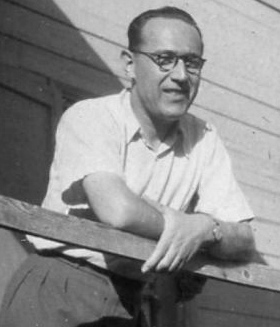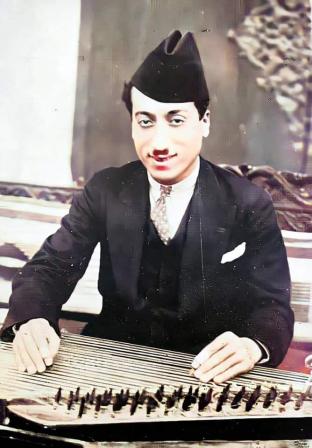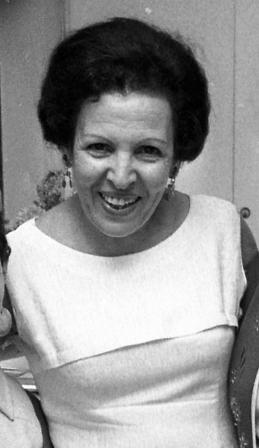Moshe Wilensky was born in 1910 in Warsaw, Poland. During World War I, his family emigrated to Russia, remaining until 1917, when they returned to Warsaw. In his youth, Wilensky attended the Jewish "Eskela" Gymnasium, which offered Hebrew instruction alongside general studies.
Wilensky's musical talent emerged at four when he began playing the piano at home. He later pursued formal piano training. At 13, he joined the Zionist youth movement Hashomer Hatzair, where he was first introduced to Israeli songs. Within the movement was a choir led by the musician Yitzhak Edel, who greatly influenced Wilensky's musical development, teaching him music theory. In 1928, Wilensky graduated from high school and, at Edel's recommendation, continued his music studies at the State Conservatory of Warsaw. In 1932, he completed his studies in composition and conducting and, at 22, immigrated to Israel with his family, settling in Tel Aviv. From 1936 to 1939, Wilensky also studied engineering at the Technion's Tel Aviv campus. In June 1939, he married theater actress Berta Yakimovska (1917–2013).
Upon his arrival in Israel in 1932, Wilensky began working as a pianist and composer at the satirical theater "Hametate" ("The Broom"). He composed music for lyrics by Natan Alterman and Yaakov Orland, including "Gedalia Reva Ish," "Elimelekh," and "Hatender Nosea," performed by Esther Gamlielit on the Hametate stage. He also composed music for films produced by the Jewish National Fund ('Hakeren Hakayemet') and for "Yomani Carmel" ("My Diary Carmel").
In 1934, Dov Mayblet, owner of the "Achva" record company, selected Wilensky to arrange 30 popular songs of the time, sung by Yosef Goland. These became Israel's first records.
In 1936, Wilensky co-founded ACUM, an association for composers and directors to preserve copyright in music and literature, alongside the promoter Zeev Markovich. Prominent poets, writers, and composers joined, including Leah Goldberg, Avraham Shlonsky, Alexander Penn, and Yedidya Admon.
In 1937, he formed the "Gilali" quartet, which performed his arrangements of Hebrew songs, Chassidic music, and jazz. The quartet, with Wilensky on piano, was featured on Israel Radio.
By the late 1930s, Wilensky had joined the satirical theater "Kol Haruhot" ("All the Spirits"), co-founded by the poet and playwright Avraham Shlonsky. For this theater, he composed "Tzarich Letzalzel Paamaim" ("Need to Ring Twice") to Alterman's words, a song that became a hallmark of the era.
In 1944, Wilensky became a regular arranger and composer at the musical theater "Li-la-Lou," where he composed the iconic song "Kalaniyot" ("Anemones") for Shoshana Damari. This was the start of a long collaboration; Wilensky composed most of her songs, including Yemenite-style pieces to lyrics by Alterman and Orland, such as "Zechariah Ben Ezra" and "Miriam Bat Nissim."
During Israel's War of Independence, he composed songs for the Palmah band, "The Cheesebatron," including "Hakrav Haaharon" ("The Last Battle"), "Hayu Zmanim" ("There Were Times"), and "Chisbat." He also accompanied Damari in performances for soldiers. In 1949, he toured the United States with Damari and Goland, achieving notable success in Jewish communities.
In 1950, Wilensky began a program on Kol Israel called "Pizmon Vazemer" ("Hymn and Singer") and composed new songs for it. Some of these songs, such as "Leor Hazikhronot" ("In the Light of Memories") and "Haroa Haktana Min Hagay" ("The Little Shepherd from the Valley"), were performed by Damari. That year, he was also appointed director of the record company Hed Artzi, which published the most popular Israeli records.
Around this time, he began working with the lyricist Yechiel Mohar. Together, as the duo "Mohroilensky," they created numerous songs for the Nahal military band, including "Ya Mishlati," "Mul Har Sinai" (about the Sinai War), "Hora Nitgaber," and "Shir Eres Negbi" ("Negev Lullaby"). Wilensky also composed for films like "Amud Haesh" ("The Pillar of Fire") and "Dan and Saadia" (a children's film) and wrote for the Hebrew operetta "Shulamit," featuring Damari in a lead role.
From 1961 to 1978, he worked for Kol Israel as head of popular music and conductor of the Israel Broadcasting Authority Orchestra. In 1963, his song "Stav" ("Autumn"), written by poet Shimshon Halafi and performed by Esther Ofarim, won first place for orchestration and second place for performance at the Sopot radio song festival in Poland. The following year, he won second place in another competition in Poland with his song "Layla Veashan" ("Night and Smoke"), written by Mohar and performed by Ilana Rubina. His songs continued to be showcased at festivals worldwide.
In 1963, Wilensky composed songs for the "Shin Shin" entertainment program at the Shi Ness Theater. In 1965, he served as musical director of "Opera Begrush" ("Opera at a Penny") by Bertold Brecht, with the Radio Entertainment Orchestra. That year, he also composed music for "Shuk Hametziot" ("The Market of Finds"), performed by Eli Gurlitzky and Yona Atari, which featured Alterman's songs like "Limon Vetzalachat" ("Lemon and a Plate") and "Elimelech." He later composed musical plays such as "Fishka" (1967), based on Mendele the Bookseller's story, and "Happy at the Port" (1971) with Dan Almagor. Wilensky retired from radio in 1978.
Wilensky composed texts by renowned poets, bringing unique sensitivity to each work. Alongside Bialik, Alterman, Mohar, and Hefer, he set to music poems by Rahel Shapira, Rabbi Avraham Itzhak Kook, Yaakov Orland, Dan Almagor, Yoram Taharlev, Tirza Atar, Natan Yonatan, Yehuda Amihai, Ehud Manor, Yossi Gamzo, Haim Keinan, Oded Avishar, and others. He also composed Avraham Stern's (Yair) poem "Harey At Mekudeshet Li Moledet" ("You Are Sacred to My Homeland").
Wilensky's music blended European and Middle Eastern elements, reflecting a style shared by prominent Israeli composers like Nahum Nardi and Mordekhai Zeira. His melodies were memorable, often complemented by intricate orchestrations. His arrangements and orchestrations, with their distinctive overtures, contributed significantly to the beauty of his compositions.
In 1983, he received the Israel Prize for his contributions to Hebrew songs. The judges noted that "Wilensky is the enduring composer of the land… His early songs and hymns are embedded in Hebrew culture and are sung to this day." In 1986, he received the ACUM Prize for Lifetime Achievement and was named an honorary citizen of Tel Aviv.
Moshe Wilensky passed away in Tel Aviv on January 2, 1997 (23 Tevet 5733).
Source: The National Library of Israel website.






